With German and Finnish forces surrounding Leningrad in the north, and a German attack imminent against Kiev in the Ukraine, Stalin ordered the evacuation of all children under 12 from Moscow. On 5 September Germany occupied Estonia. On the night of 7-8 September some 200 RAF bombers mounted the largest air raid on Berlin to date, dropping bombs for four hours.
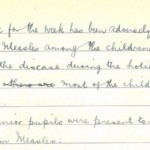
As if harassment from enemy fighter planes (and random shelling from naval ships carrying out exercises off the coast) wasn’t enough to disrupt the education of the county’s children, now Dunbeath School faced a new challenge: measles. The head teacher had already noted in the log book that “some of those who contracted the disease during the holidays are now back at school, but most of the children are suffering from it at present.” Now, on 5 September, is the note: “Only five junior pupils were present today – all the others suffering from measles.”
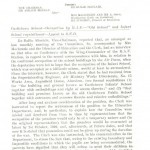
The Council’s Education Committee was trying to persuade the RAF to hand back Castletown Infant and Public Schools, which it had requisitioned, especially since the Infants School “was occupied as a billiards saloon”. But the RAF, despite previously indicating that the occupation would only be temporary, now stated that possession could not be given up during the duration of the war. Meanwhile, the parents had signified that they would refuse to send their children to school, “owing to the existing insanitary and impossible conditions in which the pupils were being accommodated.”
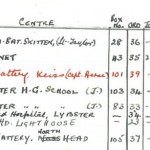 The County Library Service provided a service to the armed forces during wartime, providing reading material and training manuals for service personnel. The Wick Library issues book for the month of September shows, along with deliveries to Lybster H.G. School, Bignold hospital at Lybster and Noss Head Lighthouse, boxes of books sent to 105 A.A. Battery at Skitten, 517 Battery at Keiss, and 303 Battery, North Head.
The County Library Service provided a service to the armed forces during wartime, providing reading material and training manuals for service personnel. The Wick Library issues book for the month of September shows, along with deliveries to Lybster H.G. School, Bignold hospital at Lybster and Noss Head Lighthouse, boxes of books sent to 105 A.A. Battery at Skitten, 517 Battery at Keiss, and 303 Battery, North Head.
The Treasurer of the Wick Harbour Trust kept a diary, recording compound fees collected from fishing boats in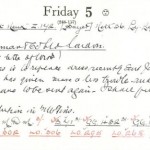 the harbour (by their registration number). On Friday 5 September he noted the text of a wire to Siebe Gorman and Co. Ltd. of London: “This dress is to replace dress recently sent you for repair which has given more or less trouble and which I fear may have to be sent again.” Siebe Gorman was a British company that specialised in diving equipment, and the “dress” referred to would have been a diving suit.
the harbour (by their registration number). On Friday 5 September he noted the text of a wire to Siebe Gorman and Co. Ltd. of London: “This dress is to replace dress recently sent you for repair which has given more or less trouble and which I fear may have to be sent again.” Siebe Gorman was a British company that specialised in diving equipment, and the “dress” referred to would have been a diving suit.
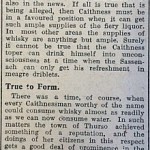 Finally this week, a debate had started in the John O’Groat Journal concerning the drinking habits of the local population. Wick had enacted prohibition back in 1922, and so people from the town had got into the habit of taking public transport to Lybster for their alcohol. As one journalist noted, “There was a time, of course, when every Caithnessman worthy of the name could consume whisky almost as readily as we can now consume water,” before concluding, “all the whisky drunk in present-day Caithness, if it were put together, would be a very small contribution to the amount consumed by the giant drinkers of the golden age.”
Finally this week, a debate had started in the John O’Groat Journal concerning the drinking habits of the local population. Wick had enacted prohibition back in 1922, and so people from the town had got into the habit of taking public transport to Lybster for their alcohol. As one journalist noted, “There was a time, of course, when every Caithnessman worthy of the name could consume whisky almost as readily as we can now consume water,” before concluding, “all the whisky drunk in present-day Caithness, if it were put together, would be a very small contribution to the amount consumed by the giant drinkers of the golden age.”
